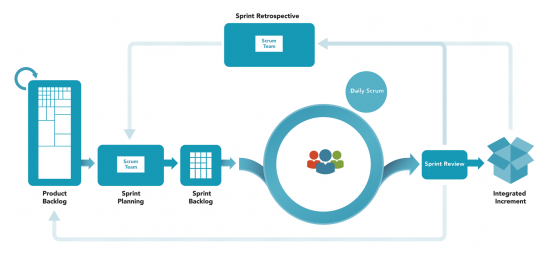Scrum
| Type | Team Size | ||||||
|---|---|---|---|---|---|---|---|
| Me, Myself and I | Group Collaboration | The Academic System | Software | 1 | 2-10 | 11-30 | 30+ |
What, Why & When
Scrum is a process framework for agile project management. You'll want to use Scrum in complex and uncertain project environments when developing a 'product'. Note that product can be defined very widely and is not confined to a physical object but can also be a piece of software, a paper or a presentation. If you are faced with a lot of uncertainty about the end-result of your project and need good, constant communication within your team, Scrum might be just right for you.
Scrum is designed for a team of no more than 5 - 7 members. While its application needs some practice, teams can easily start incorporating basics step-by-step and learn along the way. A person with Scrum experience that can advise is nonetheless very helpful.
Goals
- Manage uncertainty
- Achieve discussable & presentable results early
- Foster good communication
Getting Started

Scrum is based around the agile principles of embracing constant change and planning as little as possible and as much as necessary. Its origins are in software development. Since Scrum is a really extensive framework, please refer to Links & Further reading in order to get to know it.
Links & Further reading
Please note that most Scrum material is typically written in the context of software development as this is where Scrum originated. It can nevertheless be used for other types of project management.
Videos
- Scrum in 120 seconds: Use for a very brief overview
- Scrum in under 5 minutes: Use for a tad more detailed overview
Text
- What is Scrum: A very brief overview
- Scrum explained: A brief overview
- The Agile Manifesto: The principles upon which Scrum is built
Books
The author of this entry is Matteo Ramin.